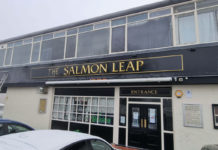Prospective lessees must do their homework, pubcos say

A NEW year is here and the prospect of change is still fresh in the minds of many, so is now the time to consider taking on a pub?
For operators with the right stuff it could well be, according to pub companies, who say there are a number of factors prospective publicans should consider before taking on a premises.
Clive Chesser, MD of Greene King Pub Partners, said the Scottish leasehold market is “very strong at this point in time”, describing the firm’s own estate as buoyant and seeing “like-for-like growth”.
“We are always on the lookout for entrepreneurial licensees with the talent and drive to build sustainable businesses in partnership with us and we have pledged to make further capital investment with transformational schemes both planned and in progress across the country,” said Chesser.
Investment is even more essential at these times.
Andy Hodgson, operations director at Admiral Taverns agreed that there’s reasons to be optimistic about the state of the leasehold market.
“In terms of trends, newcomers to the industry are increasingly viewing the tied model and the help of a supportive pub company, as a fantastic way to run their own pub,” said Hodgson.
“However, we must do more as an industry to raise awareness about the fantastic career opportunities available as a licensee and encourage more new people to join the pub industry.”
Licensees have upped the ante in recent years, according to Hodgson, who reckons publicans have become “even more entrepreneurial and ambitious”.
“They want a partner who understands ‘autonomy’ and empowers their licensees with support, training and investment, which will, in turn, help them develop their own offer,” he said.
“Licensees are becoming increasingly creative, whether it be through a unique food offer or reinventing an outside space; licensees want a partner who is flexible and can buy into their vision.”
That entrepreneurial spirit may be partly responsible for driving interest in a trend flagged up by Brian Davidson of Punch Taverns, who reckons interest in leasehold opportunities has broadened in scope recently.
“The overall position is slightly healthier than 12 months ago,” said Davidson.
“The letting interest on high street sites is always strong. However in last six months we have noticed renewed interest in community outlets, especially those with untapped food potential.”
While there are undoubtedly a number of budding licensees out there, Davidson did suggest those considering taking on a premises ask themselves a few questions first.
“Why do I want to do this? Do I have the time to fully support a new business? Have I taken financial advice from someone I can trust?” he said.
“Lastly, what does success look like in (say) three years? It’s important to have measures in place before they take a pub on rather than after they do.”
Craig Bruce, director of Rosemount Taverns echoed that, suggesting prospective tenants should be cautious when selecting a pub company to work with.
“Too many tenants are attracted by the pub itself and ‘jump in’ without researching the pub company involved,” said Bruce.
“This often leads to problems when they discover that the pub company is not a great partner.”
There’s much to consider when selecting a pub partner, but Bruce reckons for those who get it right, there’s plenty to be said for pub companies, particularly amidst the current economic uncertainty.
“In turbulent economic times, there is significantly less risk to an individual taking on a leasehold unit from a reputable company rather than investing significant sums of money through purchasing a freehold unit,” he added.
“Additionally, the lack of funding options available through the banks makes it extremely difficult for an individual to raise the capital required to acquire freehold units. Leasing, therefore, has substantial attractions.”
Access to finance was also highlighted as crucial to business success, and an area in which pub companies can provide services that may not be available to those in the freehold market by Lawson Mountstevens, MD of Star Pubs & Bars.
“Bank lending can be tight in a downturn and some freeholders find it difficult to access the funds they need for refurbishments,” he said.
“We believe that investment is even more essential at these times. When disposable income is limited, customers are more selective about where they go out, demanding quality as well as value.”
The financial side of running a pub is the “most critical” aspect of the business and an area new licensees must “get to grips with”, according to Mountstevens.
“If they don’t have the knowledge to do this, they should ensure the pub company they are leasing with can provide the training,” he added.























